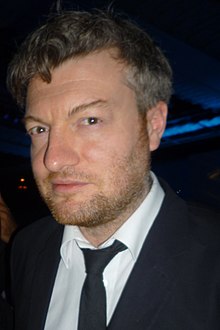Portal:Television
The Television Portal

Television (TV) is a telecommunication medium for transmitting moving images and sound. Additionally, the term can refer to a physical television set, rather than the medium of transmission. Television is a mass medium for advertising, entertainment, news, and sports. The medium is capable of more than "radio broadcasting", which refers to an audio signal sent to radio receivers.
Television became available in crude experimental forms in the 1920s, but only after several years of further development was the new technology marketed to consumers. After World War II, an improved form of black-and-white television broadcasting became popular in the United Kingdom and the United States, and television sets became commonplace in homes, businesses, and institutions. During the 1950s, television was the primary medium for influencing public opinion. In the mid-1960s, color broadcasting was introduced in the U.S. and most other developed countries.
In 2013, 79% of the world's households owned a television set. The replacement of earlier cathode-ray tube (CRT) screen displays with compact, energy-efficient, flat-panel alternative technologies such as LCDs (both fluorescent-backlit and LED), OLED displays, and plasma displays was a hardware revolution that began with computer monitors in the late 1990s. Most television sets sold in the 2000s were flat-panel, mainly LEDs. Major manufacturers announced the discontinuation of CRT, Digital Light Processing (DLP), plasma, and even fluorescent-backlit LCDs by the mid-2010s. LEDs are being gradually replaced by OLEDs. Also, major manufacturers have started increasingly producing smart TVs in the mid-2010s. Smart TVs with integrated Internet and Web 2.0 functions became the dominant form of television by the late 2010s. (Full article...)
Selected article -
Selected image -

Cable News Network, commonly referred to by its initialism CNN, is a major news cable television network founded in 1980 by Ted Turner. The network is now owned by Time Warner; the news network is a division of the Turner Broadcasting System. CNN introduced the idea of 24-hour television news coverage, celebrating its 25th anniversary on June 1, 2005.
Did you know (auto-generated) -

- ... that just four years after starting up, the president of Satellite Television & Associated Resources commented that his entire industry had "gone down the drain"?
- ... that CBS News and Stations president Wendy McMahon helped bring local evening news back to the network's Detroit station after 20 years?
- ... that Indian historian R. Champakalakshmi was a script consultant for Bharat Ek Khoj, a television series based on Jawaharlal Nehru's The Discovery of India?
- ... that the European version of the video game Tomba! uses the theme song of the television series No Sweat as its opening theme?
- ... that in the television series sequel Imortal (2010), Angel Locsin portrayed the lead role as the daughter of her lycan character in the Lobo TV series?
- ... that Dallas television station KDAF abandoned plans to launch a local newscast in 1994, after having already hired 20 staff, because it was to lose its Fox affiliation and be sold?
Selected quote -
More did you know
- ...that Richard Hanley's book South Park and Philosophy: Bigger, Longer, and More Penetrating analyzes issues of applied ethics as presented in South Park?
- ...that one of the television advertisements from the Good things come to those who wait Guinness advertising campaign was voted the "Best ad of all time" by the British public?
- ...that model Albert Reed, selected to appear in September 2007 on the United States television show Dancing with the Stars, admits that he cannot dance?
- ...that Olivia Newton-John made at least 16 appearances on The Go!! Show, an Australian popular music television series which aired between 1964 to 1967, before she found international success?
- ...that Russian television implied that Filipp Kirkorov won the Eurovision Song Contest 1995 with "Kolibelnaya Dlya Vulkana" when he in fact only came 17th?
Selected biography -

George Formby OBE (born George Hoy Booth; 26 May 1904 – 6 March 1961) was an English actor, singer-songwriter and comedian who became known to a worldwide audience through his films of the 1930s and 1940s. On stage, screen and record he sang light, comic songs, usually playing the ukulele or banjolele, and became the UK's highest-paid entertainer.
Born in Wigan, Lancashire, he was the son of George Formby Sr, from whom he later took his stage name. After an early career as a stable boy and jockey, Formby took to the music hall stage after the early death of his father in 1921. His early performances were taken exclusively from his father's act, including the same songs, jokes and characters. In 1923 he made two career-changing decisions – he purchased a ukulele, and married Beryl Ingham, a fellow performer who became his manager and transformed his act. She insisted that he appear on stage formally dressed, and introduced the ukulele to his performance. He started his recording career in 1926 and, from 1934, he increasingly worked in film to develop into a major star by the late 1930s and 1940s, and became the UK's most popular entertainer during those decades. The media historian Brian McFarlane writes that on film, Formby portrayed gormless Lancastrian innocents who would win through against some form of villainy, gaining the affection of an attractive middle-class girl in the process. (Full article...)General images
News
- December 28: US professional wrestler Jon Huber dies aged 41
- September 2: Tributes paid to recently deceased US actor Chadwick Boseman
- May 24: Japanese professional wrestler and Netflix star Hana Kimura dies aged 22
- January 16: BBC newsreader Alagiah to undergo treatment for bowel cancer
- Upcoming events
Featured content
Extended content
| ||
|---|---|---|
Featured articles
Featured lists
Featured topics
Good topics
Featured pictures
Featured portals
|
The time allocated for running scripts has expired.
History of television: Early television stations • Geographical usage of television • Golden Age of Television • List of experimental television stations • List of years in television • Mechanical television • Social aspects of television • Television systems before 1940 • Timeline of the introduction of television in countries • Timeline of the introduction of color television in countries
Inventors and pioneers: John Logie Baird • Alan Blumlein • Walter Bruch • Alan Archibald Campbell-Swinton • Allen B. DuMont • Philo Taylor Farnsworth • Charles Francis Jenkins • Boris Grabovsky • Paul Gottlieb Nipkow • Constantin Perskyi • Boris Rosing • David Sarnoff • Kálmán Tihanyi • Vladimir Zworykin
Technology: Comparison of display technology • Digital television • Liquid crystal display television • Large-screen television technology • Technology of television
Terms: Broadcast television systems • Composite monitor • HDTV • Liquid crystal display television • PAL • Picture-in-picture • Pay-per-view • Plasma display • NICAM • NTSC • SECAM
The time allocated for running scripts has expired.

The time allocated for running scripts has expired.

|
You are invited to participate in WikiProject Television, a WikiProject dedicated to developing and improving articles about Television. |
- Main projects
- Sub-projects
Television Stations • American animation • American television • Australian television • British TV • BBC • Canadian TV shows • Television Game Shows • ITC Entertainment Productions • Digimon • Buffyverse • Doctor Who • Degrassi • EastEnders • Episode coverage • Firefly • Futurama • Grey's Anatomy • Indian television • Lost • Nickelodeon • The O.C. • Professional Wrestling • Reality TV • The Simpsons • Seinfeld • South Park • Stargate • Star Trek • Star Wars • Soap operas • Avatar: The Last Airbender • House
- Related projects
Animation • Anime and manga • Comedy • Comics • Fictional characters • Film • Media franchises
What are WikiProjects?
The time allocated for running scripts has expired.

- Place the {{WikiProject Television}} project banner on the talk pages of all articles within the scope of the project.
- Write: Possible Possum
- Cleanup: color television, Alien Nation: Body and Soul, The Sopranos, Alien Nation: Dark Horizon, Alien Nation: The Enemy Within, Alien Nation: Millennium, Aang
- Expand: Timeline of the introduction of color television in countries
- Stubs: Flow (television), Just for Kicks (TV series), Play of the Month, Nova (Dutch TV series), More stubs...
The time allocated for running scripts has expired. The time allocated for running scripts has expired.
The time allocated for running scripts has expired. The time allocated for running scripts has expired.
The time allocated for running scripts has expired.
The following Wikimedia Foundation sister projects provide more on this subject:
-
Commons
Free media repository -
Wikibooks
Free textbooks and manuals -
Wikidata
Free knowledge base -
Wikinews
Free-content news -
Wikiquote
Collection of quotations -
Wikisource
Free-content library -
Wikiversity
Free learning tools -
Wiktionary
Dictionary and thesaurus




























































